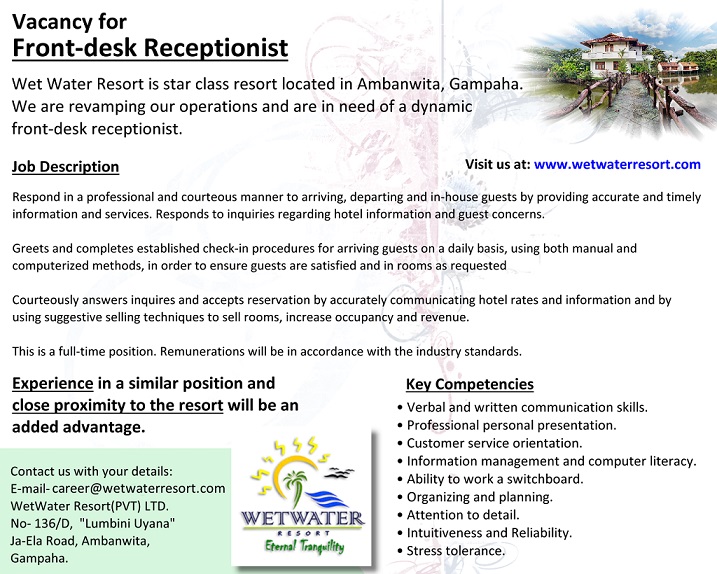In the realm of professional nomenclature, titles hold profound significance. The term “Front Desk Receptionist” is ubiquitous, yet it is often imbued with connotations that can vary dramatically across different sociocultural contexts. This intricacy of interpretation compels us to explore creative alternatives for this title, particularly through the lens of cultural relativism. Examining this can unveil hidden dimensions about workplace roles and hierarchical perceptions, offer refreshing alternatives, and promote a more inclusive atmosphere within a variety of professional environments.
The concept of cultural relativism posits that one’s beliefs and values must be understood based on one’s own cultural context. This notion can be particularly illuminating when addressing job titles and their underlying implications. A title such as “Front Desk Receptionist” might evoke thoughts of subservience or routine duties in some cultures, while in others, it may reflect a position of critical importance, often serving as the initial point of contact in a customer-centric environment. Therefore, exploring alternative titles allows for a nuanced understanding and appreciation of the role’s intrinsic value.
One viable alternative is “Customer Experience Facilitator.” This title encapsulates a broader scope than merely managing calls or greeting visitors. It emphasizes the responsibilities related to enhancing the customer’s interaction with the organization. The term “facilitator” denotes an active role in ensuring that visitors have a seamless experience, thereby transforming the perspective on the title from one of passive reception to one of proactive engagement. In cultures that prioritize customer service as an essential aspect of business, this title resonates strongly and highlights the importance of empathy and understanding.
Another interesting designation is “First Impressions Specialist.” This title underscores the critical role that the front desk personnel play in shaping the initial experiences of clients and guests. It conveys an understanding that first interactions can significantly influence perceptions of an organization’s ethos and professionalism. By adopting this title, organizations can instill a sense of pride and responsibility in the position, motivating staff to strive for excellence in their interpersonal engagements.
“Communication Gateway Coordinator” presents a more abstract alternative, appealing to the intricacies of the role in managing information flow. This title conveys a multilayered function: acting as a conduit for communication, enhancing intra- and inter-departmental collaboration, and embodying the organization’s commitment to connectivity. Particularly in corporate environments where collaboration is critical, this designation emphasizes the systemic value of the role.
In certain cultural contexts where hierarchy is pronounced, the label “Administrative Anchor” might be fitting. This term evokes stability and reliability and portrays the individual as a foundational element of the organizational structure. While embracing the necessary administrative tasks, it simultaneously illustrates a level of respect and recognition for the extensive skillset required to perform the duties effectively.
Additionally, “Visitor Liaison Officer” can serve to fortify the role’s emphasis on interpersonal dynamics. As a liaison, this individual acts as a bridge between the organization and its visitors, advocating for the needs and concerns of each party. This title is especially poignant in multicultural environments where awareness of diverse visitor expectations is crucial, promoting the idea that the role is not limited to basic reception tasks but extends into relationship-building and diplomacy.
“Frontline Engagement Executive” emphasizes a proactive and leadership-oriented approach. This title indicates that the individual is at the forefront of the organization’s customer service strategy, actively engaging with clients, addressing inquiries, and resolving issues. It positions the role as one of significance, reflecting the idea that individuals in such positions are not merely transient staff but are vital to the operational success of their organizations.
Exploring titles for front desk roles through a culturally relativistic lens reveals more than simply an exercise in semantics. It demonstrates how language can reflect, shape, and influence perceptions of workplace hierarchy and roles. When organizations adopt creative alternatives to traditional titles, they can better align themselves with their cultural contexts, enhancing staff morale and overall job satisfaction. Moreover, these redefined titles can influence how clients and visitors perceive the professionalism and culture of the organization.
In conclusion, the exploration of alternative titles for the role of “Front Desk Receptionist” through the lens of cultural relativism underscores the importance of context in shaping our understanding of professional identities. Titles such as “Customer Experience Facilitator,” “First Impressions Specialist,” “Communication Gateway Coordinator,” “Administrative Anchor,” “Visitor Liaison Officer,” and “Frontline Engagement Executive” embody a nuanced approach toward job roles, fostering an environment of respect and significance. As organizations continue to evolve in our increasingly globalized world, reexamining and redefining these titles will be an essential endeavor to promote inclusivity and appreciation for the multifaceted nature of professional roles.
